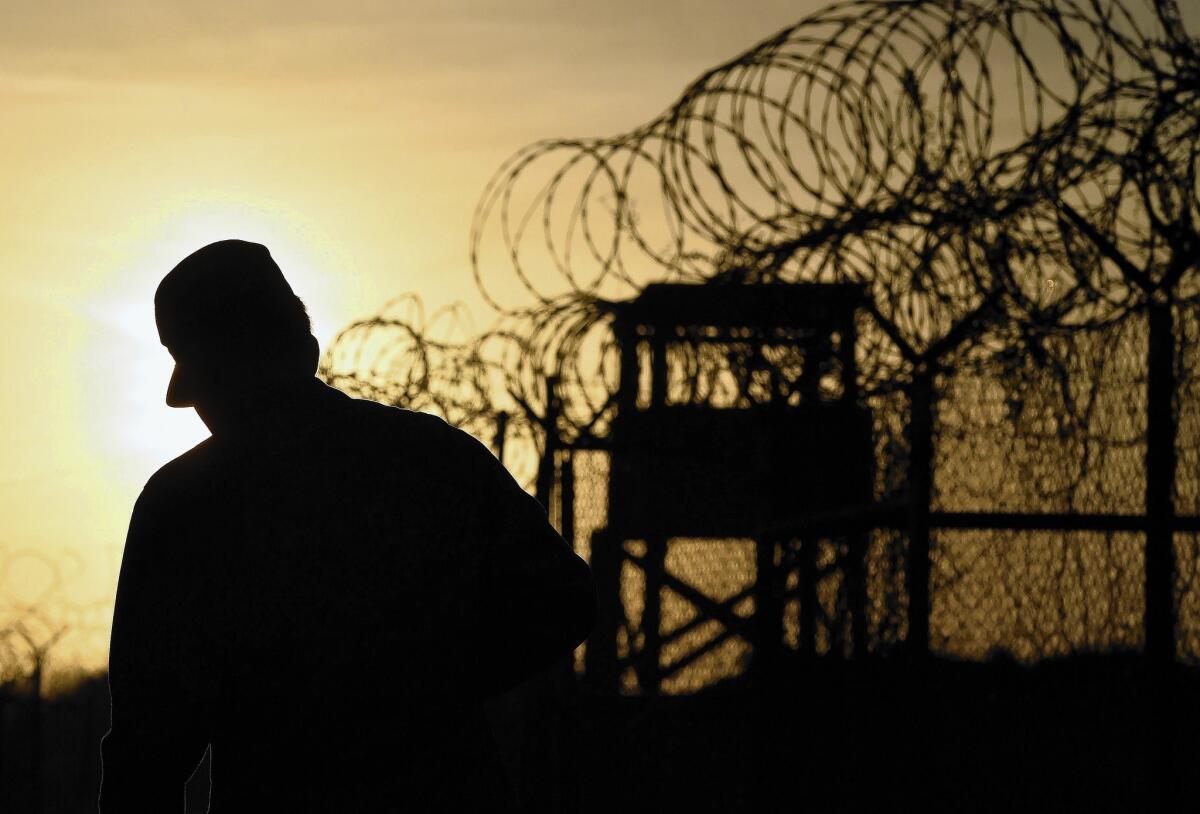Judge allows force-feeding of Guantanamo detainee

- Share via
Reporting from Washington — A federal judge reversed an order that had prevented the Pentagon from force-feeding a detainee at Guantanamo Bay, saying she “simply cannot let [him] die.”
But in ending her weeklong ban against the force-feeding of Jihad Ahmed Mujstafa Diyab, U.S. District Judge Gladys Kessler sharply criticized the U.S. military for not allowing him to be fed in a base hospital, as he requested, and instead requiring that he be strapped down at the prison compound.
Lawyers for Diyab, also known as Dhiab, have been trying for nearly a year to get federal courts to halt the feeding against their will of Guantanamo detainees who have launched hunger strikes to protest their open-ended incarcerations at the U.S. military detention facility in Cuba.
Diyab, a 43-year-old Syrian, has been cleared for release by the Pentagon’s Guantanamo Review Task Force. But despite an offer from Uruguay to take him, the Obama administration has not released him after more than 11 years in custody at Guantanamo.
On May 16, Kessler ordered the military to stop force-feeding Diyab, the first time a federal judge had directly intervened in such a way regarding the forced-feeding of Guantanamo prisoners.
The Pentagon obeyed and Diyab continued his hunger strike.
In a ruling released late Thursday, Kessler said Diyab’s “physical condition was swiftly deteriorating, in large part because he was refusing food and/or water.”
Kessler said she was “faced with an anguishing Hobson’s choice” — whether to again temporarily bar the Pentagon from force-feeding him, knowing it could have disastrous effects. There is, she said, “the very real probability that Mr. Dhiab will die.”
She noted that Diyab was willing to be fed at the U.S. naval base hospital in Cuba, something the military refuses to do. If it could be done, she said, “he could be spared the agony of having the feeding tubes inserted and removed for each feeding, and he could be spared the pain and discomfort of the restraint chair.”
Pentagon officials said they would not allow detainees to starve themselves to death. They justified the force-feeding practice, known as “enteral feeding,” as necessary to protect the health of the 150 detainees there.
“This is a deeply complex issue,” Army Lt. Col. Todd Breasseale said Friday. The Department of Defense, he added, “has long held that we shall not allow the detainees in our charge to commit suicide, and it’s particularly worth noting that we only apply enteral feeding in order to preserve life.”
Kessler faulted the military for refusing to compromise. “Thanks to the intransigence of the Department of Defense, Mr. Dhiab may well suffer unnecessary pain from certain enteral feeding practices and cell extractions,” she said, referring to the efforts required to move him from his cell. “However, the court simply cannot let Mr. Dhiab die.”
On Friday, she ordered the government to provide her with the detainee’s medical records by June 10, and by June 13 to turn over videotapes of his cell extractions and forced-feedings.
President Obama has pledged to close the detention facility. “We remain fully committed to implementing the president’s direction that we transfer detainees to the greatest extent possible,” Breasseale said.
More to Read
Sign up for Essential California
The most important California stories and recommendations in your inbox every morning.
You may occasionally receive promotional content from the Los Angeles Times.














